#ch tag: xeh
Explore tagged Tumblr posts
Text
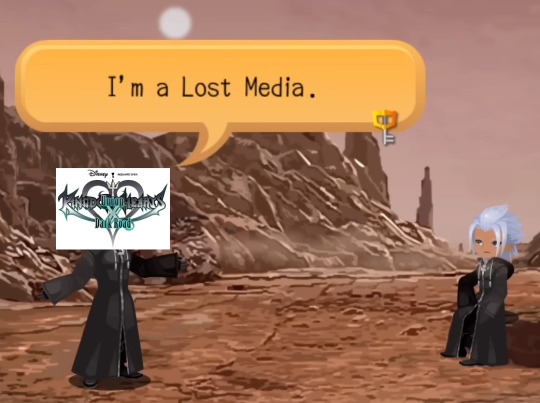
812 notes
·
View notes
Text
Absolutely. Especially if Luxu interacts with Brain in KHML (and if Brain is truly Eraqus' grandfather), which might give us more context for Bragi's friendship with Eraqus.
I think in addition to wanting to observe Eraqus, he wants to observe Xehanort as well. Since Eraqus is best friends with Xehanort, being close to Eraqus means being close to Xehanort too, but in a way that's more casual and less suspicious. Xehanort may be good friends with everyone in his class, but I feel like he's the type of person who'd be very picky about who he chooses to be very close to. Meaning if Bragi wants to keep a close eye on Xehanort in a way that looks natural, it's more advantageous for him to do so by "proxy" via his friendship with Eraqus (see: the first screenshot in your post). And we know for sure that Bragi is interested in Xehanort due to Bragi's official bio stating:
"He often asks Xehanort for his opinion on various matters, whether out of respect or to gauge his intent." <- though of course the reasons given here are probably just to hide his true motivations as Luxu.
Rewatching the KHDR cutscenes and it really is fascinating how obvious the Bragi/Luxu thing is on a second playthrough. Like we all know the Brain/Bragi/Braig name similarities and stuff but it is very interesting how close Bragi seems to Eraqus.


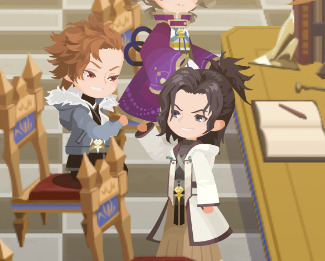
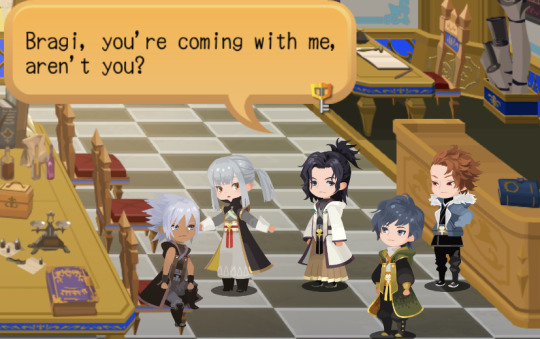

It makes a lot of sense if you’re thinking of Luxu, of course he’d want to stay close Eraqus, he’s the living legacy of the keyblade masters of old, it’s a sure bet he’d be important, and isn’t it his role to keep an eye on anything that looks like it matters?
idk just something I’ve been thinking about
#other people's meta#rambling about dim path#ch tag: brag#ch tag: era#ch tag: xeh#khux spoilers#khdr spoilers
177 notes
·
View notes
Text



109 notes
·
View notes
Text
Some nice attention to detail
In Episode 6 of KHDR, Xehanort notices Jafar's darkness/greed after shaking his hand. The implication is either that (1. physical contact is required for Xehanort's empathy powers to work, or (2. physical contact just enhances Xehanort's empathy powers.

And then in the end credits scene, when Player asks Xehanort to describe his dream friends to them, Xehanort is seen holding Player's hand, potentially making it easier for him to recall what those friends looked like. (After all, dreams are difficult to remember with perfect clarity once you wake up, right?)

178 notes
·
View notes
Text
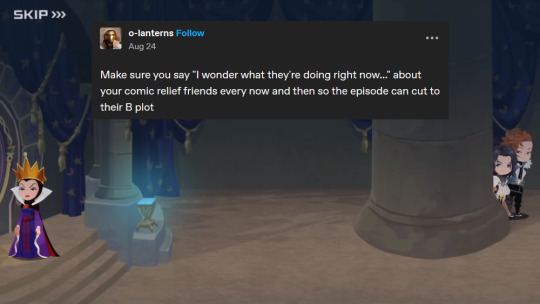
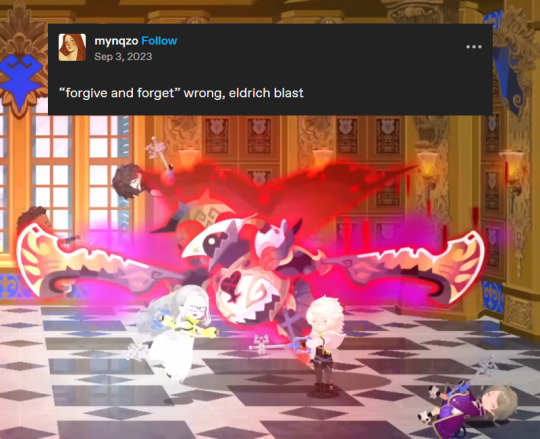
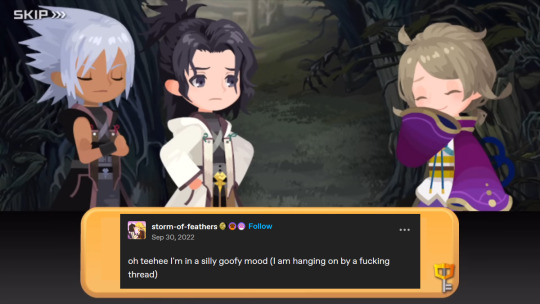
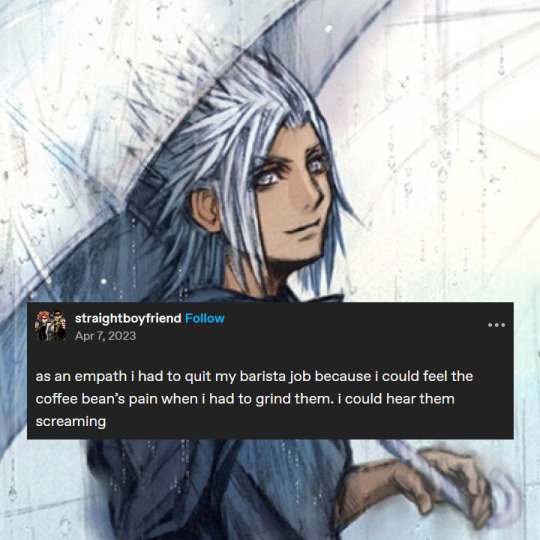
97 notes
·
View notes
Text
A detail of Xehanort forcing Sora into Rage Form during his final boss fight in KH3 that you might not fully recognize in the heat of battle is that Xehanort doesn't just take away Sora's light, he actually uses it against him.
Xehanort says "Enlighten me." before he forces you into Rage Form. Xehanort glows gold during this sequence and all of his attacks have a golden "light" appearance to them (though according to the wiki these attacks still do dark damage, interestingly. Maybe there's a connection there to the concept of "false light", or maybe it's just a back-end gameplay balancing thing and story-wise we're still meant to interpret these attacks as light-based.) The information bar says "Attack Master Xehanort to reclaim your light!" and when you do so, orbs of light fall out of Xehanort with each hit.
In addition to just being a really neat and unexpecteed sequence where you're thrust into sudden danger (you can't use magic or heal in Rage Form, and it doesn't go away over time in this particular fight), it also suggests that Xehanort is proficient at wielding both darkness and light (though he does have to take it from someone else, apparently), which better reflects his philosophy of balance and light and darkness in equal shares.
As well, it's a timely reminder within the chaos of this epic clash between light and darkness that Sora, a hero of light, still harbors immense darkness within him (Rage Form) and that Xehanort, a villain of darkness, has not been completely rejected by the light even if he can no longer muster a substantial amount of it by himself.
It kinda feels like KH3 is saying "Hey. By the way. We know this game is all about this fated, good-versus-evil battle between light and darkness, but before we conclude the story, here's a (violent and sudden in order to catch your attention) reminder that it's actually a lot more nuanced than that—there is light within darkness as well as darkness within light."
71 notes
·
View notes
Text
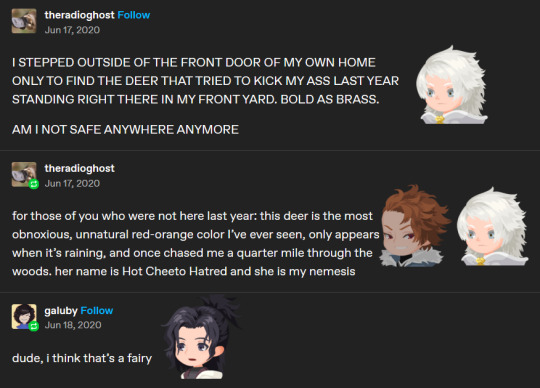
-----------------------
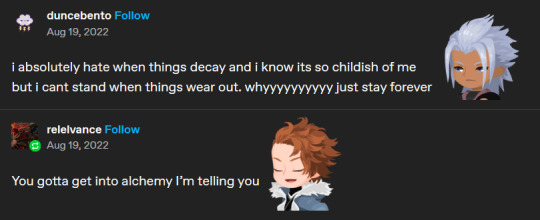
-----------------------

57 notes
·
View notes
Text



64 notes
·
View notes
Text
Personally, I'm betting my money that the crown symbol is being retroactively recontextualized as a signifier of a Child of Destiny candidate, not necessarily something that represents Ephemer and his bloodline. Thus why Xehanort and Sora are both seen wearing that symbol, since it's implied that Sora might be the Child of Destiny.
This interpretation could still involve Riku, though. Pair all the discussion about Riku maybe being the Child of Destiny (or maybe used to be them until Sora took the role?) with the necklace theory and it would make sense that Riku once owned an object with this exact same crown imagery.
Granted, when I say that I think the crown = Child of Destiny candidate I'm mostly talking from a meta perspective. I'm not sure if the crown has an established in-universe meaning, like this particular imagery popping up around these characters might just be intended as a coincidence or something. Kind of like how the Kingdom Key has a Mickey head keychain but literally no one in the games ever addresses it or mentions it, with the implication being that it has nothing to do with Mickey in actuality. The audience knows why the symbol is there and what it represents even if the meaning of said symbol only exists outside of the narrative and can only be perceived by the audience.
That being said though, Riku having white/silver hair could definitely still be an indicator that he's related to Eph. Especially if you're right about necklace theory and the crown being a symbol of Ephemer's bloodline. It would be neat if KHML gives us a definitive yes/no answer to that, like if we suddenly see crowns everywhere whenever Ephemer is brought up then that would be some solid evidence.
Would Xehanort’s armor having Sora’s crown necklace imagery be more evidence towards maybe Riku being part of Ephemer’s bloodline? (Of course it all depends on if we’re saying necklace theory is correct)
Also side note that probably means nothing(?): Ephemer, Xehanort, and Riku are the only characters with a combination of white hair and black eyelashes [with white hair and white eyelashes being a thing with Hoder and Baldr]
106 notes
·
View notes
Text
It truly is fitting that the Xehanort game was the one that explored this idea of like. Love and empathy having the potential to turn into corrupting forces. People hurting each other and themselves due to the despair and insecurity born from intense love. Things that ought to be associated with light and goodness (and that usually are in the main games) instead leading to darkness and suffering.
Eraqus with his bright and well-meaning comments to Baldr that are nonetheless ignorant and hurtful (Scala's teachings in general). Vidar's feelings of love and mercy compelling him to destroy darkness and save Baldr for his friends' sake, a normally heroic and selfless desire that would be awarded in any other KH game as others before me have noted, but because this quest is misguided, Vidar's methods too extreme, it turns into a fruitless, failure of an endeavor that ends up causing more death rather than preventing it. Baldr's adoration of his sister, his love for her, twists into an obsessive, self-esteem destroying dependency that leaves a gaping hole in his heart the perfect size for darkness to call home.
Over and over again, examples of the "false light" that the Master of Masters described to Xehanort.
Like yeah no wonder Xehanort turned out like that. He was trapped in a story where—what were ostensibly—acts of goodness and light were either utterly ineffective at preventing tragedy or were easily corrupted under the right conditions. The form of "light" wielded by his instructors and peers, the people who were supposed to protect and guide the world, let him down on such a profound level that his perception of its efficacy and righteousness suffered as a result; he completely lost faith in whatever was masquerading as "true light" in this world...or, you know, that's probably how he viewed it, anyway.
In his eyes, better to turn to darkness for his goals because at least it's good at getting shit done and not pretending to be something it isn't, assuming you're strong enough to bring it to heel and not let it corrupt you. And Sora wasn't around yet to prove him wrong, to prove that true light and goodness still exist in the world and you don't have to throw everything away and start over...
So yeah out of all the potential KH games that could've introduced (debatable)/explored this topic I'm glad it was the Xehanort one because it just makes so much sense for his character and where the series is at now, especially with the Lost Masters arc on the horizon featuring: the Master of Masters, a villain (question mark) seemingly motivated by light and light alone.
55 notes
·
View notes
Text



66 notes
·
View notes
Text
Realizing that Xehanort's classroom being located right above the Scala tower "clock" also means that his old classroom is directly below where Sora fights and kills him in KH3. Damn.
62 notes
·
View notes
Text

82 notes
·
View notes
Text



#making kh edits#rambling about dim path#I know the last one was used for KH 1 already but it was so Xeha and Player as well#ch tag: vo#ch tag: brag#ch tag: xeh
99 notes
·
View notes
Text
[KH3] Young Xehanort: But if the light of friendship is a form of power...the darkness of being alone is a power...even greater.
I wonder if MX decided to use people like Ven and Marluxia (who were supposed to be his dream friends) because he genuinely thought that seeking their friendship was a weakness and would be an active liability to his greater goal.
Like, "regardless of how much I desire connection, being alone is the only way I'll be strong enough to accomplish my goals."
Not just a situation of "I stopped caring about them over time/they're only useful to me as tools now" but instead "I care about them still but I can't and shouldn't and won't by sheer force of will."
Vor also abandoned friendship to seek greater inner strength...and died after changing her mind and returning to her friends.
I wonder if Xehanort ever thought that Vor was weak, too.
79 notes
·
View notes
Text
Really hoping that Xehanort being heavily paralleled with all three of the Destiny Trio (Sora, Riku, Kairi) is a hint that all three of them are Children of Destiny and the prophecy was never actually about just one person carrying the weight of the world on their shoulders.
91 notes
·
View notes